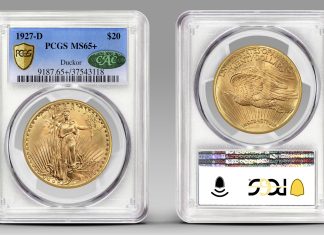
Following a retreat to the $1,355.00 area, gold prices picked up fresh hedge fund-sourced steam this morning and climbed to the upper $1,360’s with relative ease, despite that near three-week highs recorded in the values of the US dollar against the European common currency and despite the apparent ebbing of Egyptian turmoil levels.
Cairo quieted down — but only so much — as domestic workers seized the opportunity of the ouster of Mr. Mubarak to demand better pay and living conditions from the new (but really, not) junta running the place for now. The deposed ruler was reported to be in a ‘coma’ at his Red Sea residence, while the country’s military dissolved the Parliament and suspended the Constitution on Sunday.
Spec funds bid gold higher this morning, in part, perhaps, due to the euro’s woes (some see no real progress on the regional debt crisis following today’s summit of European finance ministers) but also on the back of Egypt-like ‘vibes’ coming from some distance from Cairo; Bahrain. The country’s king has been warned by domestic human rights groups not to quell imminent "peaceful" protests lest he is prepared for a "worst-case scenario." Rocks and batons have also taken flight in Yemen this morning, and the first tiny signs of a possible anti-government upheaval in a non-Arab country, Iran, have been on display amid the grass-roots contagion enveloping the Middle East and North Africa.
Silver spot prices rose by 74 cents and were seen attempting to get past resistance levels beyond $30.50 amid continuing hard money hype about putative physical shortages of the metal. Platinum and palladium raced ahead amid the generalized commodity buying spree this morning, with the former adding $27.00 to climb to the $1,828.00 level and the latter gaining $19.00 to reach the $831.00 per ounce mark. Palladium continues to draw support from tight fundamentals and is still receiving more love notes from ETFs than the average Valentine’s Day recipient might, even today.
Similar, spec fund-driven buys were noted in the emerging markets sector and in other commodities this morning, as news that China’s exports jumped 38% last month made its way into the financial media’s headlines. That said, Reuters reported that China’s overall trade surplus fell to its lowest in nine months in January after imports surged, supporting the government’s case ahead of a G20 meeting that it is doing enough to spur domestic demand without speeding up currency appreciation.
Copper once again topped the $10K mark, oil reversed its calmer Egypt-induced early losses, and wheat rose nearly 2% following the Chinese trade balance statistics. Gyrations (to the downside) in crude oil were first attributed to the easing of Egyptian tensions, but its gains were later chalked up to…rising tensions in other Middle Eastern nations (along with perceptions that rising Chinese imports must also imply rising oil imports).
Quiz time: Which economy is the world’s largest? Well, if you are responding from the USA, the odds are 52% in favor of the fact that you’ve answered: China. [Insert sound of buzzer, here]. Wrong. While China is, now, indeed, the second-ranked player on the global economic scene (having edged ahead of Japan by a disputable amount last year), its GDP is still only 39% of the size of that of the US economy.
Explaining why Americans see things this way — even as Goldman Sachs only sees China achieving that status in, maybe, 15-20 years- is the real challenge here. Chalk it up to great PR, perhaps. PR, which, would have to go into overdrive when/if the obvious property bubble there bursts and changes that (and the global) economic equation, in a hurry. The folks at theGallup organization will just have to take a new…poll at such a juncture.
Fed-related news this Monday morning brings us a dovish assertion from NY Fed President Dudley. The gentleman sees a US economy that is not quite ‘healthy’ enough to call for the ‘all-clear’ signal to be issued. Mr. Dudley — a well-known supporter of QE2 (along with Charles Evans) — also sees a continuing and ‘substantial amount of slack in our labor markets’ — and thinks, he, one that will require ‘time to absorb.’
Meanwhile, The Mother Of All budget battles is seen as soon taking shape in Washington following this morning’s submission of the 2012 $3.7 trillion US spending and revenue plan by President Obama. Some will argue that the cuts proposed by the US President do not go far enough, while others will fight tooth-and-nail to keep certain "sacred cow" programs from being affected at all.
The clearest conclusion to be drawn from the current Congressional Budget Office’s budget assumptions is that Americans better get used to paying as much as 30% higher taxes- and soon- lest they are comfortable with the idea that they will be ‘contributing’ not to a $7 trillion aggregate deficit (as the CBO envisions over the next decade) but perhaps one as large as…$12 trillion.
The other ‘take-home’ inference from the line items contained in the proposed budget is the fact that unless US defense spending (three-quarter trillion per annum, or fully 51% or more of the ‘problem’) comes under some kind of curtailment, well, the States can kiss the idea of lower deficits "good-bye." America currently spends more on defending itself (from what, anymore?) than it did back when Nikita Khrushchev offered to be the "undertaker" of American capitalism in 1956.
Yet, even the most rabid, conservative budget-slashing "poster boys" (Rand Paul, for one) in Washington do not dare mention anything more than symbolic cuts when it comes to the sacrosanct "D" word. And, Mr. & Mrs. Taxpayer appear to be curiously turning a blind eye to the defense issue, even as the red deficit ink spreads faster than the Red Menace ever actually did.
The other "menace" that is now on many an educated lip, is the one related to food. None other than Prof. Nouriel Roubini, (the NYU economist who predicted the U.S. financial crisis), now says that surging global food and energy costs are stoking emerging-market inflation that’s "serious enough to topple governments." Hosni Mubarak over in Egypt can attest to that. Or, perhaps not, as he is in a coma, according to news reports (or just severely depressed, according to others).
The Bloomberg article that cites Mr. Roubini’s latest warning finds that:
"There’s an extreme irony in the timing of all this. It’s coming as the world is becoming a heavier place. Obesity rates have almost doubled since 1980 and almost 10 percent of humanity was seriously overweight in 2008, according to the medical journal The Lancet. People have never been fatter at the same time when food prices have never been so high."
The sobering Bloomberg piece asserts that the "Westernization" of Asian diets is partly behind the rise in food costs. Rapid growth, rising incomes, growing populations and urbanization are conspiring to shift eating habits away from the staples of old toward livestock and dairy products. Such trends however, "will complicate things for China’s central bank" as well as for those of Indonesia, India, the Philippines, Pakistan, and Vietnam. Conclusion: "This will be an inconvenient reality check for Asia bulls."
Bon Appetit. Today, at least, skip that burger and have a…chocolate, but not a big one. Look at sugar values.
Jon Nadler
Senior Analyst
Kitco Metals Inc.
North America
www.kitco.com and www.kitco.cn
Blog: http://www.kitco.com/ind/index.html#nadler










